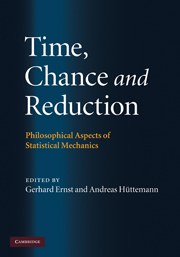1 - Introduction
Published online by Cambridge University Press: 04 August 2010
Summary
Statistical mechanics and philosophy
Statistical mechanics attempts to explain the behaviour of macroscopic physical systems (in particular their thermal behaviour) in terms of the mechanical properties of their constituents. In order to achieve this aim it relies essentially on probabilistic assumptions. Even though in general we do not know much about the detailed behaviour of each degree of freedom (each particle), statistical physics allows us to make very precise predictions about the behaviour of systems such as gases, crystals, metals, plasmas, magnets as wholes.
The introduction of probabilistic concepts into physics by Maxwell, Boltzmann and others was a significant step in various respects. First, it led to a completely new branch of theoretical physics. Second, as Jan von Plato pointed out, the very meaning of probabilistic concepts changed under the new applications. To give an example: whereas before the development of statistical physics variation could be conceived as the deviation from an ideal value this was no longer a tenable interpretation in the context of statistical physics. Genuine variation had to be accepted (von Plato, 2003: 621).
Furthermore, the introduction of probabilistic concepts triggered philosophical speculations, in particular with respect to the question whether the atomic world does indeed follow strict deterministic laws (cf. von Plato, 1994; Stöltzner, 1999). For instance, in 1873 Maxwell gave a lecture entitled ‘Does the Progress of Physical Science tend to give any advantage to the opinion of Necessity (or Determinism) over that of the Contingency of Events and the Freedom of the Will?
- Type
- Chapter
- Information
- Time, Chance, and ReductionPhilosophical Aspects of Statistical Mechanics, pp. 1 - 10Publisher: Cambridge University PressPrint publication year: 2010



